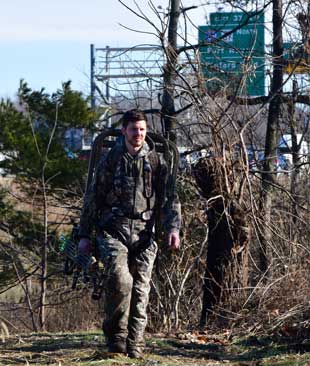Managed Hunting Technical Assistance
- Fish & Wildlife
- Landowner and Wildlife Habitat Assistance
- Current: Managed Hunting Technical Assistance

Managed deer hunting can increase hunting opportunities for white-tailed deer in communities and help alleviate human/deer conflicts. The Division of Fish & Wildlife can provide technical assistance to administer hunting programs in communities with such a need. With managed hunting, each community has oversight and flexibility to determine the location and time of the hunts and which hunters can participate. This allows communities to realize which techniques can be best used to meet their wildlife management goals.
Please note, that managed hunts through individual communities are NOT the same as reserved or draw hunts.
Regulated deer hunting is a practical and cost-effective method for deer herd management and has been implemented successfully in Indiana for many years; however, for many reasons, deer hunting is relatively uncommon in areas with large numbers of people. High densities of human dwellings, complex land ownership, perceived safety concerns, and other factors create a need for expert coordination and management of community hunts. Deer management is an ongoing process and there is no one-time fix for conflicts.
How can hunting opportunities be allocated through managed hunting?
Communities determine the best methods for allocating hunting opportunities. The hunter application and selection process could vary by community, depending on the community’s goals, objectives, and other factors. Communities could choose to implement various strategies for acquiring participants for their hunt, including hiring hunt coordinators, using local hunters, implementing a reserved draw, or using the Indiana Private Lands Access Program (IPLA). IPLA offers financial incentives to landowners who allow controlled public hunting access on their private property.
Past communities that used managed hunting
2018: Cordry-Sweetwater Conservancy District, Central Indiana Land Trust at Oliver’s Woods Nature Preserve, and Central Indiana Land Trust at Laura Hare Preserve at Blossom Hollow made available 1,303 acres for hunter access, allowing 730 hunting opportunities.
2019: Cordry-Sweetwater Conservancy District, Central Indiana Land Trust at Oliver’s Woods Nature Preserve, Central Indiana Land Trust at Laura Hare Preserve at Blossom Hollow, Bloomington Parks and Recreation Department, Duneland Beach Homeowners Association, Indiana Oaks Golf Club, and Wesselman Nature Society. These applicants made 3,191 acres available for hunter access, allowing for 1,057 hunting opportunities.
2020: Cordry-Sweetwater Conservancy District, select Central Indiana Land Trust properties in multiple counties, Bloomington Parks and Recreation Department, Duneland Beach Homeowners Association, Indiana Oaks Golf Club, and Wesselman Nature Society. These applicants made 3,353 acres available for hunter access, allowing for 843 hunting opportunities.
2021: Sweetwater Conservancy District, select Central Indiana Land Trust Properties in multiple counties, Bloomington Parks and Recreation Department, Duneland Beach Homeowners Association, Indiana Oaks Golf Club, Save Maumee Grassroots Organization, and Wesselman Nature Society. These applicants made 3,173 acres available for hunter access, allowing for 976 hunting opportunities.
Trained coordinators
Steve Morris
Kokomo, IN 46901
hsm13498@gmail.com
765-437-9114
Robert Rudisill
Boonville, IN 47601
rudisill0649@gmail.com
812-217-0649
Rusty Fields
Greenfield, IN 46140
Rusty@Rustysanimalcontrol.com
317-714-2028
Ryan Rodts
St. Joseph Co., IN
ryan.rodts@whitebuffaloinc.org
517-937-7187
Kyle Cross
Greene Co., IN
kyledcross14@gmail.com
812-887-0970
Rick Bramwell
Madison Co., IN
rickbramwell@aol.com
765-617-0657
Eldon Hojem
Greene, Lawrence, Monroe, Morgan, and Owen Co., IN
Ehojem@hotmail.com
812-606-1355
Eric Lowe
Indianapolis, IN 46259
Hoosierwildlifecontrol@comcast.net
317-362-4199
More information
For communities that are new to white-tailed deer management in community settings, the Methods for Managing Human-Deer Conflicts can be helpful. For more information, please email Jessica Merkling, urban wildlife biologist at jmerkling@dnr.IN.gov.
